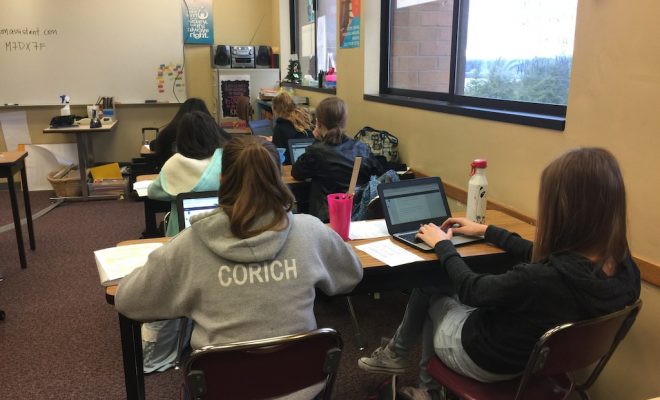What causes mind blanks during exams?

This article was written by Jared Cooney Horvath and Jason M Lodge
In our five-part series, Making Sense of Exams, we’ll discuss the purpose of exams, whether they can be done online, overcoming exam anxiety, and effective revision techniques.
It’s a pattern many of us have likely experienced in the past.
You prep for an exam and all the information seems coherent and simple. Then you sit for an exam and suddenly all the information you learned is gone. You struggle to pull something up – anything – but the harder you fight, the further away the information feels. The dreaded mind blank.
So what is going on?
To understand what’s happening during a mind blank, there are three brain regions we have to become familiar with.
The first is the hypothalamus. For all intents and purposes, we can conceive of the hypothalamus as the bridge between your emotions and your physical sensations. In short, this part of the brain has strong connections to the endocrine system, which, in turn, is responsible for the type and amount of hormones flowing throughout your body.
The second is the hippocampus. A subcortical structure, the hippocampus plays an incredibly important role in both the learning and retrieval of facts and concepts. We can conceive of the hippocampus as a sort of memory door through which all information must pass in order to enter and exit the brain.
The third is the prefrontal cortex (PFC). Located behind your eyes, this is the calm, cool, rational part of your brain. All the things that suggest you, as a human being, are in control are largely mediated here: things like working memory (the ability to hold and manipulate information in your mind), impulse control (the ability to dampen unwanted behavioural responses), decision making (the ability to select a proper response between competing possibilities), etc.
How a mind blank happens
When you are preparing for an exam in a setting that is predictable and relatively low-stakes, you are able to engage in cold cognition. This is the term given to logical and rational thinking processes.
In our particular instance, when you are studying at home, seated in your comfortable bed, listening to your favourite music, the hypothalamus slows down the production and release of key stress hormones (outlined below) while the PFC and hippocampus are confidently chugging along unimpeded.
However, when you enter a somewhat unpredictable and high-stakes exam situation, you enter the realm of hot cognition. This is the term given to non-logical and emotionally driven thinking processes. Hot cognition is typically triggered in response to a clear threat or otherwise highly stressful situation.
So an exam can serve to trigger a cascade of unique thoughts – for instance,
If I fail this exam I may not get into a good university or graduate program. Then I may not get a good job. Then I may perish alone and penniless.
With this type of loaded thinking, it’s no wonder that those taking tests sometimes perceive an exam as a threat.
When a threat is detected, the hypothalamus stimulates the generation of several key stress hormones, including norepinephrine and cortisol.
Large levels of norepinephrine enter the PFC and serve to dampen neuronal firing and impair effective communication. This impairment essentially clears out your working memory (whatever you were thinking about is now gone) and stops the rational, logical PFC from influencing other brain regions.
At the same time, large levels of cortisol enter the hippocampus and not only disrupt activation patterns there, but also (with prolonged exposure) kill hippocampal neurons. This serves to impede the ability to access old memories and skews the perception and storage of new memories.
In short, when an exam is interpreted as a threat and a stress response is triggered, working memory is wiped clean, recall mechanisms are disrupted, and emotionally laden hot cognition driven by the hypothalamus (and other subcortical regions) overrides the normally rational cold cognition driven by the PFC.
Taken together, this process leads to a mind blank, making logical cognitive activity difficult to undertake.
Is there any way to avoid this?
The good news – there are some things you can do to stave off mind blanks.
The first concerns de-stressing. Through concerted practice and application of cognitive-behavioural and/or relaxation techniques aimed at reframing any perceived threat during an exam situation, those taking tests can potentially abate the stress response and re-enter a more rational thinking process.
Another concerns preparation. The reason the armed forces train new recruits in stressful situations that simulate active combat scenarios is to ensure cold cognition during future engagements.
The more a person experiences a particular situation, the less likely he or she is to perceive such a situation as threatening.
So when preparing for an exam, try not to do so in a highly relaxed soothing environment – rather, try to push yourself in ways that will mimic the final testing scenario you are preparing for.
• Read more from the series.
![]()
Jared Cooney Horvath, Postdoctoral fellow, University of Melbourne and Jason M Lodge, Senior Lecturer, Melbourne Centre for the Study of Higher Education & ARC-SRI Science of Learning Research Centre, University of Melbourne
This article was originally published on The Conversation. Read the original article.





